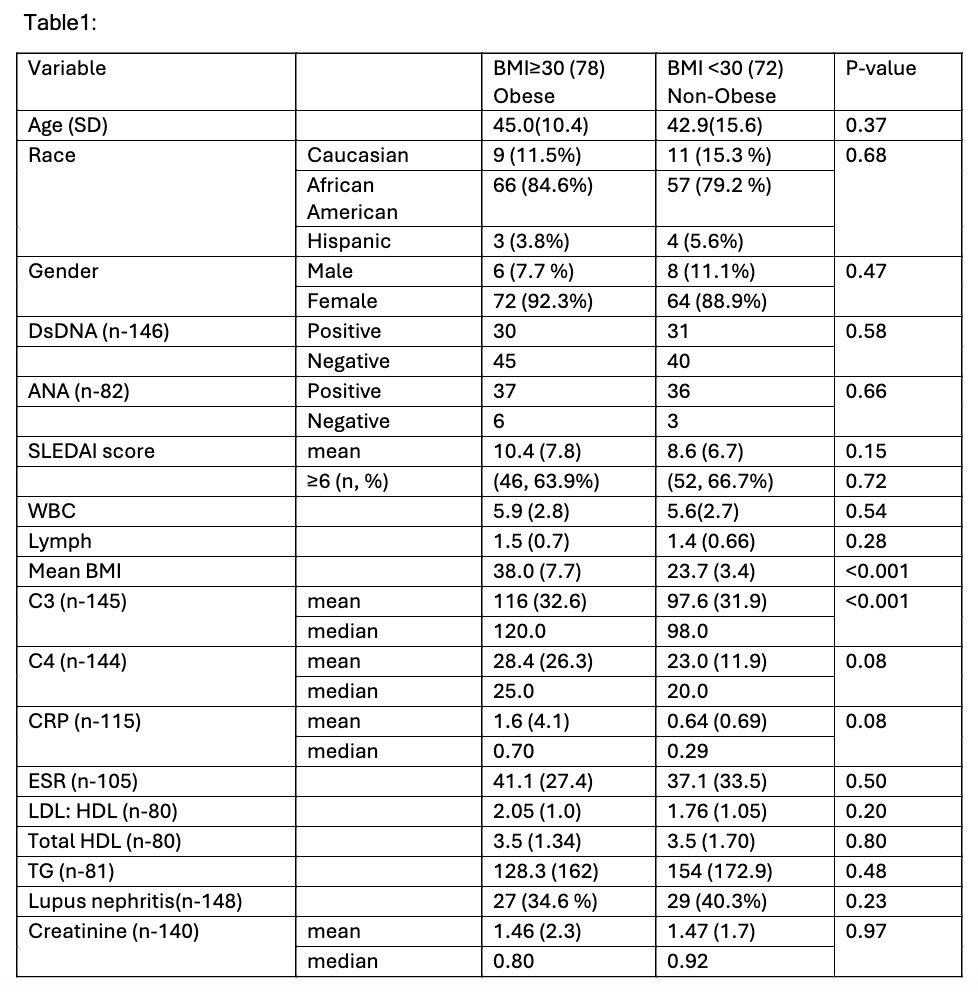Session Information
Date: Tuesday, October 28, 2025
Title: (2377–2436) Systemic Lupus Erythematosus – Diagnosis, Manifestations, & Outcomes Poster III
Session Type: Poster Session C
Session Time: 10:30AM-12:30PM
Background/Purpose: Obesity, a prevalent condition, is known to exacerbate inflammation and could potentially influence the progression and severity of autoimmune diseases like Systemic lupus erythematosus (SLE). Despite this, limited research has explored the impact of obesity on disease activity and biomarkers in SLE patients. This retrospective study aims to investigate how obesity affects disease activity, as measured by the SLEDAI, and various biomarkers, and renal function, in SLE patients.
Methods: Using data from Slicer Dicer (via EPIC) and Redcap, we analyzed 150 SLE patients at LSU Health Shreveport in 2021, divided into 78 obese (BMI ≥ 30 kg/m²) and 72 non-obese (BMI < 30 kg/m²) patients. We examined SLEDAI, WBC count with lymphocytes, anti-dsDNA, ANA levels, C3 and C4 levels, ESR, CRP, creatinine, lupus nephritis presence, LDL to HDL ratio, total HDL, and triglycerides. Results are presented as mean±SD. Statistical analyses were made using the unpaired Student’s t-test, with p< 0.05 considered significant.
Results: This study enrolled 150 lupus patients: 136 females (90.7%), 14 males (9.3%); 123 African Americans (82.0%), 20 Caucasians (13.3%), 7 Hispanics (4.7%). Although anti-dsDNA and ANA interpretations were similar between obese and non-obese groups, obese patients demonstrated worse outcome with a higher trend of SLEDAI score compared to the non-obese group (10.8±7.8 vs 8.6±6.7). In addition, obese lupus patients showed significantly higher frequencies of more than two joints arthritis (95.83% vs 33.33%) and lupus rush (66.67% vs 25%) than the non-obese group. The increasing trend of CRP(70 mg/L+4.1 vs 29mg/L+0.69) and ESR level (41.1±27.4 mm/hr vs 37.1±33.5mm/hr) was found in the obese lupus patients compared to nonobese lupus patients, but didn’t reach statistical significance. No difference was observed in triglyceride level, LDL: HDL ratio, WBC counts, creatinine level, and lupus nephritis between the obese group and the non-obese group. Surprisingly, we found that the obese group had significantly higher C3 levels (116±32.6 mg/dL) compared to the non-obese group (96.7±31.9 mg/dL) (p< 0.001). The C4 level was also higher in the obese group (28.4±26.3 mg/dL) than in the non-obese group (23.0±11.9 mg/dL).
Conclusion: Our results indicate that obesity in lupus patients is associated with elevated C3 levels, higher mean SLEDAI scores, and inflammation-related parameters, suggesting a potential link between obesity and worse outcomes in SLE. Other clinical and laboratory parameters (such as autoantibody, lupus nephritis) did not show significant differences, implying that obesity may not affect humoral immunity in SLE. Further research at the cellular and molecular levels on obese lupus patients will help us understand the impact of obesity on lupus progression and management. Disclosures: No Disclosures
To cite this abstract in AMA style:
Nadeem D, Ali A, Balmuri S, Mattison M, Agrawal U, Zamora-Smith A, Sachdeva K, leeth T, Quinet R, Davis W, Zakem J, Keshavamurthy C, Zhang X, Umer S, Hayat S. Does Obesity Influence Disease Activity and Biomarkers in Systemic Lupus Erythematosus Patients?: A Retrospective Study [abstract]. Arthritis Rheumatol. 2025; 77 (suppl 9). https://acrabstracts.org/abstract/does-obesity-influence-disease-activity-and-biomarkers-in-systemic-lupus-erythematosus-patients-a-retrospective-study/. Accessed .« Back to ACR Convergence 2025
ACR Meeting Abstracts - https://acrabstracts.org/abstract/does-obesity-influence-disease-activity-and-biomarkers-in-systemic-lupus-erythematosus-patients-a-retrospective-study/


.jpg)